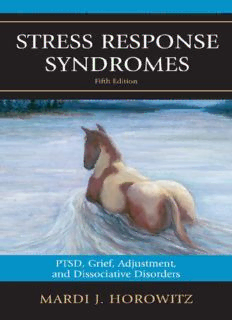
Stress Response Syndromes: PTSD, Grief, Adjustment, and Dissociative Disorders PDF
Preview Stress Response Syndromes: PTSD, Grief, Adjustment, and Dissociative Disorders
Stress Response Syndromes Stress Response Syndromes PTSD, Grief, Adjustment, and Dissociative Disorders Fifth Edition M J. H , ardi orowitz Md JASON ARONSON Lanham • Boulder • New York • Toronto • Plymouth, UK Published by Jason Aronson A wholly owned subsidiary of The Rowman & Littlefield Publishing Group, Inc. 4501 Forbes Boulevard, Suite 200, Lanham, Maryland 20706 http://www.rowmanlittlefield.com Estover Road, Plymouth PL6 7PY, United Kingdom Copyright © 2011 by Jason Aronson Publishers, Inc. All rights reserved. No part of this book may be reproduced in any form or by any electronic or mechanical means, including information storage and retrieval systems, without written permission from the publisher, except by a reviewer who may quote passages in a review. British Library Cataloguing in Publication Information Available Library of Congress Cataloging-in-Publication Data Horowitz, Mardi Jon, 1934– Stress response syndromes : PTSD, grief, adjustment, and dissociative disorders / Mardi J. Horowitz — 5th ed. p. cm. Summary: “I kept the well-supported assertions from the earlier edition and added essential new information. The most important changes involved diagnostic considerations as we head for DSM-V and ICD-11. Treatment suggestions are updated with more attention to the formulations needed for helping complex, ‘real world’ cases. I also updated the emotional information processing theory.”—Provided by publisher. Includes bibliographical references and index. ISBN 978-0-7657-0839-7 (hardback) 1. Post-traumatic stress disorder. 2. Post-traumatic stress disorder—Case studies. I. Title. RC552.P67H67 2011 616.85’21—dc23 2011021748 ™ The paper used in this publication meets the minimum requirements of American National Standard for Information Sciences—Permanence of Paper for Printed Library Materials, ANSI/NISO Z39.48-1992. Printed in the United States of America For those strangers who, roused by a shared sense of humanity, help others overcome difficult events, providing compassion, restoration, and hope. And, more personally, in loving memory of Lillian and Morris Horowitz, who taught me compassion, restoration, and hope. Contents Foreword to the First Edition ix Preface to the Fifth Edition xi Acknowledgments xiii Part onE: StrESS rESPonSE SyndromES 1 Intrusion and Denial: A Prototypical Case 3 2 Clinical Observations and Syndromes 9 3 Field Studies on the Impact of Life Events (with Nancy Wilner) 41 4 Experimental Findings (with Stephanie Becker and Nancy Wilner) 63 Part two: GEnEral thEory oF SymPtom Formation 5 Explanation of Symptom Formation 77 6 Reschematization 97 7 Mourning 109 Part thrEE: trEatmEnt and individual variationS 8 Treatment 127 9 Inhibitory Operations: Reactions to Stress and Psychotherapy with Histrionic Personalities 157 10 Switching Maneuvers: Reaction to Stress and Psychotherapy with Compulsive Personalities 165 11 Sliding Meanings: Reaction to Stress and Psychotherapy with Narcissistically Vulnerable Personalities 175 vii viii CONTENTS Part Four: CliniCal ExamPlES 12 Loss of a Limb (with Robert Nadol) 185 13 An Automobile Accident (with Richard Olson, M.D.) 199 14 Visual Shock and the Compulsion to Look (with Erik Gann) 243 15 Suicide of a Parent (with Frederick Parris) 253 16 Suicide of a Friend (with Robert Hammer) 271 References 283 Index 303 About the Author 307 Foreword to the First Edition This book by Dr. Mardi Horowitz on the psychological understanding and the psychotherapeutic amelioration of specifically circumscribed psychopathological entities, the Stress Response Syndromes, is an exciting and long-needed investi- gation that reflects the creative interplay of psychotherapy, research, and prac- tice. It is, after all, of the essence of the clinical, medical, and health disciplines, the so-called healing arts, of which psychotherapy par takes, that continuing advance in understanding and in practice should accrue from the effective and creative interplay of formal research, basic investigation—in theoretical struc- ture, in experi mental laboratory, or in field observation or survey—in interplay with the clinical experience and clinical reflection of the bedside, or in our instance, the consulting room. It is this creative inter play between research and practice, leading to the enhancement of both, which has been so underdeveloped in our “peculiar” science with its heretofore essentially one-sided development of clinical insight and understanding without the signal benefit of concomitant growth from the formal and systematic research side of any comparable insight and understanding. Mardi Horowitz’s book is a multifaceted model, or rather a series of models, paradigmatic of a new genre, that brings psycho therapy research meaningfully into the clinical picture; that is, where each influence furthers the other. What is the nature then of these models? There is first a model of problem setting and problem delineation in the field of psychological understanding and psychological intervention. Through a sequence (1) of typical clinical case history in sufficient detail; (2) of equally detailed and at the same time wide-ranging field observation and survey drawing upon disaster and extreme circumstance, whether wartime military combat or peacetime fire or shipwreck, whether such inhumane extreme circumstances as concentration camps and nuclear holocaust or more “everyday” ix
Description: